Photographs: B Mathur/Reuters
Future historians would look upon the past decade as an important, integrated and a distinctive phase in India-United States relations which could be described in a single phrase: A period of transformation in bilateral relations.
My own perspective is shaped by the personal experience of having served in Washington, DC, in the late 1990s and returning to this city a decade later. The transformation in the relationship has five different aspects to it.
One, the level of engagement and dialogue has become intense and broad-based, strategic in nature and global in perspective. It is conducted in a spirit of warmth, candour and mutual confidence. We now speak to each other on crises and challenges in our neighborhood and around the world and work together where we can in a way that was unimaginable a decade ago.
I sense a greater appreciation of and sensitivity to each others' concerns and interests and a belief that in a fundamental sense, we are on the same side of the table. We have learned to discuss our differences and not allow them to affect other aspects of our relationship. We recognise that our relationship could be of immense value to both countries and to the world. Governments in India and the US across democratic transitions have invested extraordinary and sustained political attention and effort into the relationship over the past decade.
Second, beyond the political dialogue, India and the US have over 25 bilateral mechanisms for consultations, the most wide-ranging that India has with any country. These have brought not only a broad range of people on both sides into closer engagement, but these mechanisms have opened the doors to new possibilities of cooperation, creating a constantly expanding base for the relationship.
Third, our cooperation has entered new territories and explored new frontiers. Our militaries, once unfamiliar with each other, now hold regular dialogue and joint exercises in the air and on land and sea. We coordinate anti-piracy efforts and have worked together on humanitarian missions. Our defence trade was negligible a decade ago. We placed orders worth $3.5 billion last year, and it could grow even more in the future. Defense trade is not merely a commercial transaction; it reflects mutual confidence and a long-term strategic relationship. Our counterterrorism cooperation has acquired new momentum after the Mumbai terrorist attacks in November 2008.
The India-US civil nuclear agreement, signed in October 2008, is as strong on symbolism as it is on substance. The agreement not only removed a major problem that shadowed and constrained bilateral relations for three decades, but it has created a basis for closer relations, deeper economic ties, and a more productive partnership on energy security, lessening reliance on fossil fuel, and combating proliferation. We have also, in yet another sign of mutual confidence, overcome concerns of the past on India's space programme and have made a promising beginning to a new era of cooperation. Indeed, the Chandrayaan moon mission of India carried a US experimental payload.
Indo-US economic ties have been knowledge-, technology- and people-intensive
Image: Former US secretary of state Condoleezza Rice with Indian minister Kapil SibalPhotographs: Kevin Lamarque/Reuters
Five, the bilateral context of the relationship has also undergone a change, especially with India's economic reforms and acceleration in its economic growth. India-US trade has doubled just in the last five years. US exports to India have grown three times during the same period.
While the US is the largest source of foreign investments in India, Indian direct investment into the US has also been growing rapidly and, in fact, on the basis of annual flows, exceed US foreign direct investment into India in recent years.
Beyond the statistics, though, is the fact that because Indo-US economic ties have been knowledge-, technology- and people-intensive, it has had a profound impact on the relationship that goes beyond the business sector.
Further, 2.7 million Indian Americans, 95,000 Indian students in the US, and hundreds of thousands of people traveling between the two countries are shaping political perspectives in the two countries.
The government in Delhi has entered the second term with the priorities of restoring the momentum of economic growth, expanding infrastructure, emphasising rural development, improving basic social services, and strengthening internal and external security. We do so in an environment of global economic stress, profound geopolitical changes, especially in Asia, as also regional instability and the continuing threat of terrorism in South Asia.
External relations will remain vital to our national policy, and in this context we will continue to attach importance to our relations with the United States for meeting our national development goals.
The next phase of the relationship will be marked by continuity and would be a period of consolidation and expansion. We have set a vigorous process of bilateral engagement immediately after the elections in India were completed.
'The prime minister will be President Obama's first State guest'
Image: Prime Minister Manmohan SinghPhotographs: B Mathur/Reuters
In the past three months, Secretary (of State Hillary) Clinton, National Security Adviser General Jim Jones, and Undersecretary for Political Affairs William Burns have visited India.
November 24, Prime Minister Manmohan Singh will be the first State guest of President (Barack) Obama, which we see as a sign of the President's personal commitment to the relationship.
As we look to the future, we hope first to substantially expand our economic ties and help create jobs and prosperity in both countries. In part, this will be driven by global economic recovery and the relative health and competitiveness of the Indian and US economies.
But we also recognise that the two governments, working in partnership with the private sector, can create conditions that raise our economic ties to an entirely new level. We are optimistic that we in India can return to the path of 8 to 10 percent economic growth annually.
The Indian economy will continue to be a huge economic opportunity, whether it is increasing power, generating capacity fivefold in the next 20 years, or connecting India with itself and with the rest of the world, or providing a wide range of services to the burgeoning urban city dwellers and farm-dependent rural population in India.
Our investments in infrastructure alone over the next five years would require, at the very least, $500 billion at India prices. This is an enormous challenge for India, but also an enormous business opportunity, and I would encourage US companies to look more closely at the opportunities which this affords.
'We hope we can make a strategic shift to reduce dependence on fossil fuel'
Image: Power-generating windmill turbines at the Suzlon wind farm at Sanodar villagePhotographs: Amit Dave/Reuters
As India prepares to bring commercial energy to the 400 million people who still don't have access to it, we hope we can make a strategic shift to reduce dependence on fossil fuel.
The India-US partnership, in seeking a greener future, can help us in achieving our goal and will in turn be as productive and economically beneficial to both countries as our partnership in the knowledge economy has been.
The Indian government has set up various missions to deal with the impact of climate change in India, and one of these pertains to solar energy, where we hope to be able to build our solar energy generation to about 20,000 megawatts by 2020.
Now, that's a very ambitious target, given that we don't have solar energy generation on any significant scale today, but we have plenty of sun, and if we are able to work together to develop a technology which is more robust and to bring down the cost of solar energy generation vis-a-vis conventional energy, I think this would be a huge opportunity.
Another area would be biomass fuels. In India, we are probably amongst the largest users of biomass fuels in the world because we use it in a traditional way, with the dried cow dung cakes being used in the villages for fuel. Now, that's inefficient and it's also bad for the health. Can we find ways of transforming this into biomass fuel in more modern and clean ways which could help to meet energy demands in rural India?
These are just some of the examples I want to put before you to show the kind of opportunities that we have to work together in ways which will benefit India's development, will benefit the environment, and also provide an impetus to technology development and commercialisation of green technologies in the US.
In the coming years we will also pursue cooperation with renewed vigour in developing agriculture, improving food security, advancing health care, expanding and reforming our higher education, and leveraging our scientific and technical resources to bring innovation and human empowerment to the centre of engagement.
Even as we focus on the economy, environment, energy, education, enterprise and empowerment, we will also seek closer partnership in meeting our increasingly convergent interest on traditional, unconventional and new challenges.
'Our partnership with the US is not directed against or influenced by any other country'
Image: Then president George W Bush signs the historic India-US nuclear cooperation billPhotographs: Paresh Gandhi
We also exchange views and discuss approaches on other developments in South Asia, and we now increasingly talk about the wider Asia region -- Africa and Latin America. The Indian Ocean, vital to global commerce and energy flow and home as much to natural disasters as to piracy, is becoming a strong focus of India-US engagement and lies at the forefront of our growing security cooperation.
This fall, APEC's (Asia-Pacific Economic Cooperation) joint defence policy group will meet to outline the strategic context of defence engagement, a roadmap that builds on the impressive growth in military ties in recent years, and extend it into defence trade and collaboration.
I believe that Home Minister Chidambaram's visit laid the foundation for a more robust and productive cooperation in the future in counterterrorism, especially through improved institutional linkages, intelligence sharing, and threat assessments.
Given the similar framework of democracy and federalism in both countries, we hope to learn from the US as we reform our internal security structure, institutions, systems and technologies to make them better capable of meeting the challenges that we face.
India and the US have shared more deeply than many other countries the goals of nonproliferation and a nuclear weapons-free world. The civil nuclear agreement has now created a platform for us to cooperate more on advancing our shared goals.
On a global platform, we do face asymmetry of resources, scale and capacity, but in our own ways, India will work with the US and others for strengthening the global economy, achieving a successful outcome to the (World Trade Organisation's) Doha Development Round, and reaching a fair and equitable agreement in accordance with the United Nations Framework Convention on Climate Change in Copenhagen.
Of course, from the Indian point of view, the recent developments in the global economy and the challenges that we face underscore the need to reform the global architecture, whether in the field of politics and security or in the field of economics, to give greater voice to emerging countries.
Following the global economic crisis, we have seen greater representation for the emerging economies by way of their inclusion in the Financial Stability Forum of the IMF (International Monetary Fund) in the Basel Committee by way of their inclusion in the Basel Committee on Banking Supervision and so on.
But we need to extend it to give greater voice and voting share as well as a greater say in the governance of these structures. The reform of the UN Security Council is, we believe, another important area which would help to strengthen the legitimacy and efficacy of the UN as an instrument for dealing with some of the challenges that we face.
India and the US have been described as natural strategic partners. However we choose to describe the relationship between the world's two largest democracies, there is no denying that there is enormous comfort and goodwill in the relationship and a great sense of optimism, excitement and purpose in our joint endeavours.
Our partnership with the US is not directed against or influenced by any other country, and it does not affect India's relations with any other country. We do not see this relationship in traditional paradigms.
We move forward on the basis of potential and opportunities in the context of our bilateral relations, and then what we can do together, mirrored in our shared ideals and hopes, to meet the important challenges of our times and to advance peace and prosperity in our increasingly interdependent and interconnected world.
Excerpted from a speech India's Ambassador to the United States Meera Shankar delivered at the Atlantic Council's South Asia Centre in Washington, DC, September 14.

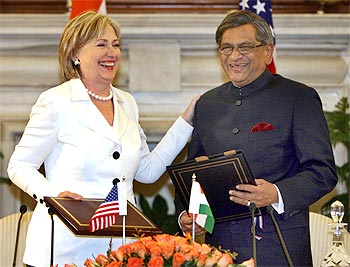
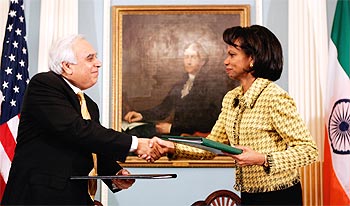
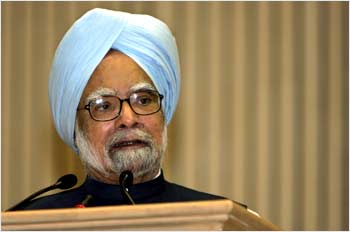
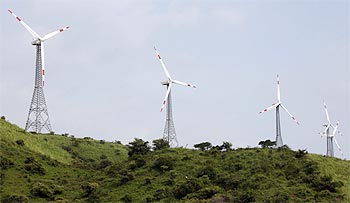
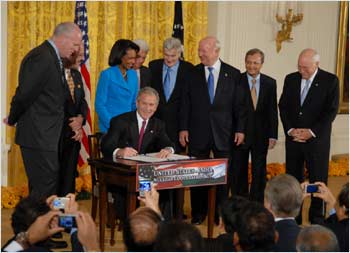
article